Do you own a business? Or are you thinking about starting one? Do you find it overwhelming to handle your business all on your own? Are you looking for techniques to grow your business to the places you always dreamt of?
If yes, then this article is for you. The topic of our discussion today is basically how you can grow your business by improving business relationships. What do we mean by business relationships? Business relationships mean the connection that the company has with its customers or clients. This is highly affected by contact management, sales management, productivity, etc.
Without customer relationship building, businesses cannot get successful. This is where the CRM software comes in the way. The software can be used by anyone. Most of the time, when you start a business you may not need such help being a beginner. You might have fewer customers and clients making it easy for you to manage without any specific help.
But you have to plan the success too. When the business starts to grow, you cannot just sit there the whole day trying to track and write about the customer interactions you had that day. You will eventually need some assistance to do the whole work.
If you focus on just the customer relation without any other help you will not be able to focus on the real business, the products, or the service which might become an issue at the end of the day. Moreover, with this software, you also will have to spend a lot of cash on different numbers of assistance. And so the software saves your money too.
CRM Software-What is it?
CRM software stands for Customer Relationship Management software. It is a technology tool that businesses use to manage and analyze their interactions with customers and potential customers.
CRM software is designed to help businesses keep track of customer data such as contact information, purchase history, and preferences. It can also be used to track customer interactions, such as phone calls, emails, and social media interactions.
The main goal of CRM software is to improve customer satisfaction, streamline communication with customers, and increase sales. By using a CRM system, businesses can provide better customer service, personalize their marketing efforts, and make data-driven decisions.
CRM software can be customized to fit the specific needs of a business, and it can be used in a variety of industries, including retail, healthcare, and finance. Some popular CRM software providers include Salesforce, HubSpot, and Zoho.
Benefits of the Software:
There are several benefits of using CRM software for businesses. Here are some of the key benefits:
Improved customer relationships: CRM software allows businesses to better understand their customers and personalize their interactions. This can lead to improved customer satisfaction, loyalty, and retention.
Streamlined communication: CRM software can centralize customer data and allow employees to access it in one place, which can reduce the risk of miscommunication and improve collaboration.
Increased efficiency: By automating tasks such as lead management and follow-up reminders, CRM software can help businesses save time and increase productivity.
Better data management: CRM software can help businesses collect and analyze customer data, which can be used to make informed decisions about marketing, sales, and product development.
Improved sales performance: By providing insights into customer behavior and preferences, CRM software can help businesses identify sales opportunities and improve their sales performance.
Scalability: As businesses grow, their customer base and data management needs may increase. CRM software can help businesses manage this growth by providing tools for data organization, analysis, and automation.
Overall, CRM software can help businesses improve their customer relationships, streamline communication and processes, and make data-driven decisions that can lead to increased sales and business growth.
Best CRM Software 2023:
We have gathered some well-known and good-performance Best CRM Software for you in 2023.
We hope this article guides you well and helps you in selecting the software that suits you and your business:
- Salesforce CRM
- Monday sales CRM
- Pipedrive
- HubSpot CRM
- Zoho CRM
- ClickUP
- Freshsales CRM
- Zendesk Sell
- Creatio CRM
- SugarCRM Sugar Sell
- Less Annoying CRM
- Apptivo CRM
- Insightly CRM
- Scoro
1. Salesforce CRM – #1 CRM Software in 2023:
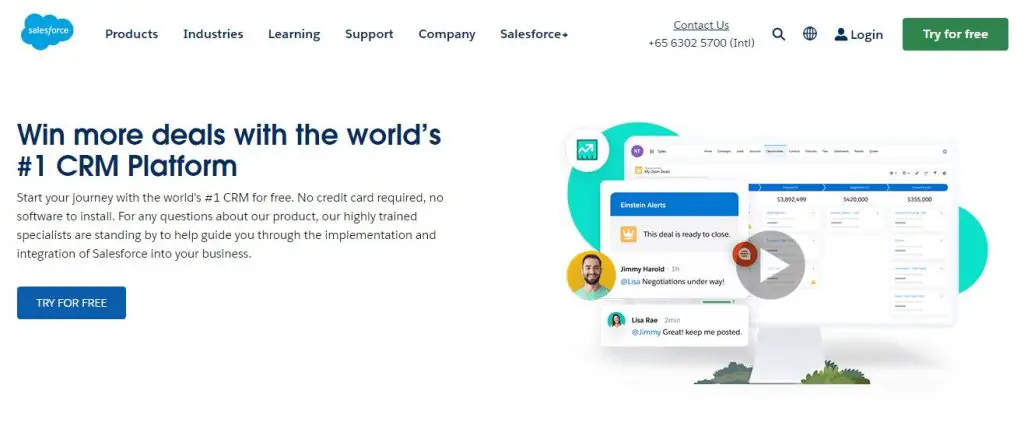
Salesforce is a cloud-based customer relationship management (CRM) software platform that allows businesses to manage their customer data, sales processes, and customer interactions in one central location.
Salesforce is designed to help businesses improve their customer relationships, streamline their sales processes, and make data-driven decisions. Some key features of Salesforce include:
Contact management: Salesforce allows businesses to store and manage customer contact information, including email addresses, phone numbers, and social media handles.
Lead and opportunity management: Salesforce can help businesses track leads and opportunities through the sales pipeline, from initial contact to closed deal.
Sales forecasting: Salesforce provides tools for forecasting sales and identifying trends in customer behavior.
Marketing automation: Salesforce includes marketing automation tools that can help businesses automate marketing campaigns and track the results.
Analytics and reporting: Salesforce provides analytics and reporting tools that can help businesses gain insights into their customer data and sales processes.
Customization: Salesforce can be customized to fit the specific needs of a business, with features such as custom fields, workflows, and integrations with other business systems.
Salesforce is used by a wide range of businesses, from small startups to large enterprises, and it is known for its user-friendly interface and robust features.
2. Monday Sales CRM: Top CRM Software:
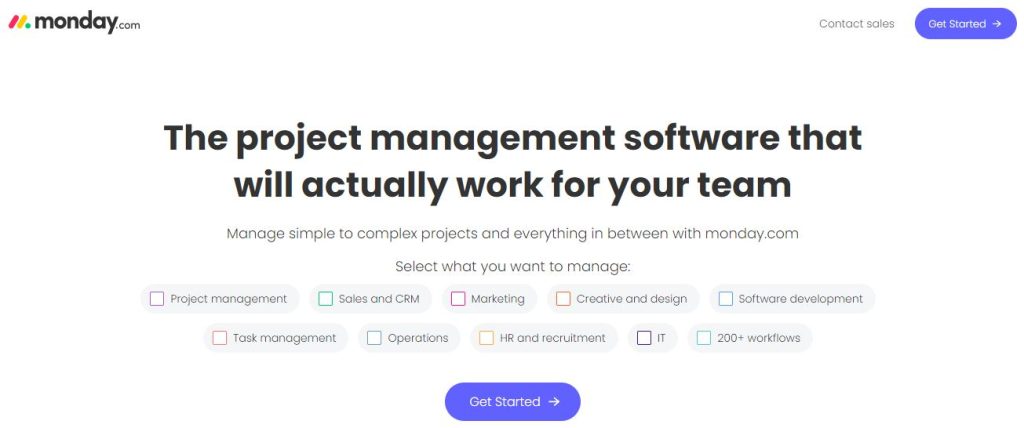
Monday.com is a cloud-based project management and team collaboration platform that offers a variety of features, including a Sales CRM tool.
Monday Sales CRM is designed to help businesses manage their customer relationships, sales processes, and pipelines. Some key features of Monday Sales CRM include:
Contact management: Monday Sales CRM allows businesses to store and manage customer contact information, including email addresses, phone numbers, and social media handles.
Lead and opportunity management: Monday Sales CRM provides tools for tracking leads and opportunities through the sales pipeline, from initial contact to closed deal.
Sales forecasting: Monday Sales CRM provides tools for forecasting sales and identifying trends in customer behavior.
Reporting and analytics: Monday Sales CRM provides analytics and reporting tools that can help businesses gain insights into their customer data and sales processes.
Email integration: Monday Sales CRM can integrate with email systems such as Gmail and Outlook to help businesses manage their email communications with customers.
Customization: Monday Sales CRM can be customized to fit the specific needs of a business, with features such as custom fields, workflows, and integrations with other business systems.
Monday Sales CRM is designed to be user-friendly and customizable, and it can be used by businesses of all sizes. It is particularly well-suited for businesses that prioritize collaboration and teamwork, as it provides tools for team communication and collaboration within the sales process.
3. Pipedrive – Best CRM Software:
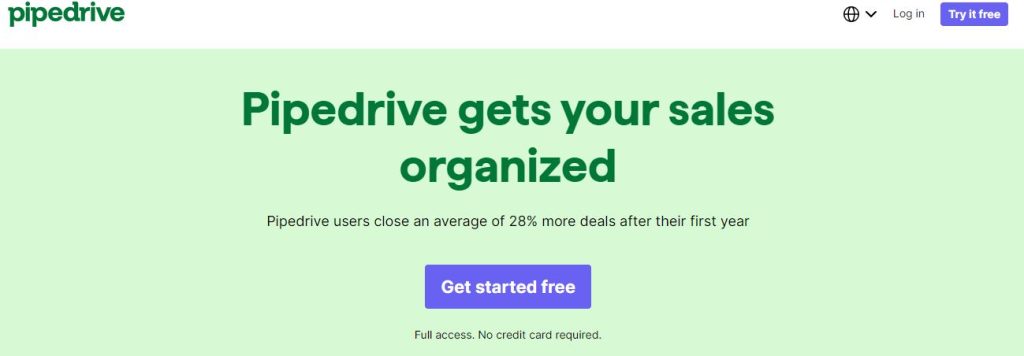
Pipedrive is a cloud-based CRM software platform that is focused on helping businesses manage their sales processes and pipelines. It is designed to be easy to use and customizable to fit the specific needs of each business.
Some key features of Pipedrive include:
Sales pipeline management: Pipedrive provides tools for managing the sales pipeline, allowing businesses to track deals through various stages of the sales process.
Contact management: Pipedrive allows businesses to store and manage customer contact information, including email addresses, phone numbers, and social media handles.
Sales forecasting: Pipedrive provides tools for forecasting sales and identifying trends in customer behavior.
Reporting and analytics: Pipedrive provides analytics and reporting tools that can help businesses gain insights into their customer data and sales processes.
Email integration: Pipedrive can integrate with email systems such as Gmail and Outlook to help businesses manage their email communications with customers.
Customization: Pipedrive can be customized to fit the specific needs of a business, with features such as custom fields, workflows, and integrations with other business systems.
Pipedrive is designed for businesses of all sizes, but it is particularly well-suited for small and medium-sized businesses that prioritize ease of use and simplicity. It has a user-friendly interface and provides a variety of integrations with other business tools, such as marketing automation platforms and e-commerce systems.
4. HubSpot CRM – Free CRM Software:
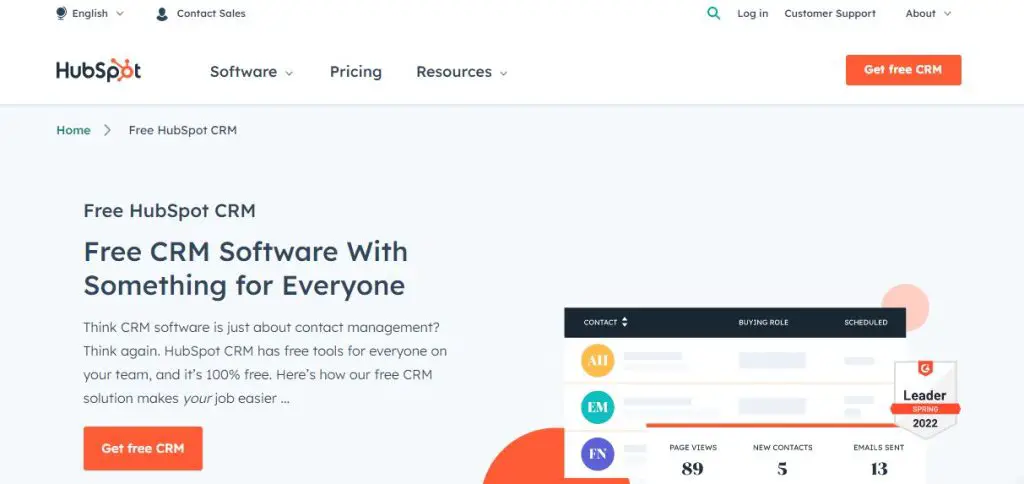
HubSpot CRM is a cloud-based customer relationship management (CRM) software platform that is designed to help businesses manage their customer data, sales processes, and marketing campaigns in one central location.
Some key features of HubSpot CRM include:
Contact management: HubSpot CRM allows businesses to store and manage customer contact information, including email addresses, phone numbers, and social media handles.
Lead and opportunity management: HubSpot CRM provides tools for tracking leads and opportunities through the sales pipeline, from initial contact to closed deal.
Marketing automation: HubSpot CRM includes marketing automation tools that can help businesses automate marketing campaigns and track the results.
Sales forecasting: HubSpot CRM provides tools for forecasting sales and identifying trends in customer behavior.
Reporting and analytics: HubSpot CRM provides analytics and reporting tools that can help businesses gain insights into their customer data and sales processes.
Email integration: HubSpot CRM can integrate with email systems such as Gmail and Outlook to help businesses manage their email communications with customers.
Customization: HubSpot CRM can be customized to fit the specific needs of a business, with features such as custom fields, workflows, and integrations with other business systems.
HubSpot CRM is designed for businesses of all sizes, but it is particularly well-suited for small and medium-sized businesses that prioritize inbound marketing and customer engagement. It is known for its user-friendly interface and the ability to integrate with other HubSpot marketing tools to create an all-in-one marketing and sales platform.
5. ClickUp – CRM Software:
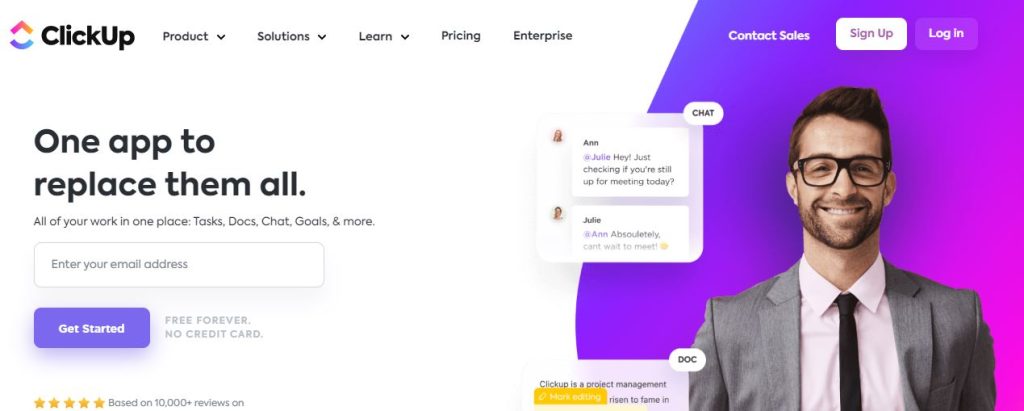
ClickUp is a cloud-based project management and team collaboration platform that offers a variety of features, including a CRM tool.
ClickUp CRM is designed to help businesses manage their customer relationships, sales processes, and pipelines. Some key features of ClickUp CRM include:
Contact management: ClickUp CRM allows businesses to store and manage customer contact information, including email addresses, phone numbers, and social media handles.
Lead and opportunity management: ClickUp CRM provides tools for tracking leads and opportunities through the sales pipeline, from initial contact to closed deal.
Sales forecasting: ClickUp CRM provides tools for forecasting sales and identifying trends in customer behavior.
Reporting and analytics: ClickUp CRM provides analytics and reporting tools that can help businesses gain insights into their customer data and sales processes.
Email integration: ClickUp CRM can integrate with email systems such as Gmail and Outlook to help businesses manage their email communications with customers.
Customization: ClickUp CRM can be customized to fit the specific needs of a business, with features such as custom fields, workflows, and integrations with other business systems.
ClickUp CRM is designed to be customizable, and it can be used by businesses of all sizes. It is particularly well-suited for businesses that prioritize collaboration and teamwork, as it provides tools for team communication and collaboration within the sales process. It also offers a variety of integrations with other business tools, such as marketing automation platforms and e-commerce systems.
Conclusion:
To end the discussion, we would like to say that we have collected the data for all of the well-known and important CRM software we could find. The details added to the list are to make it easier for you to select the one you need according to your needs and the pricing of the software. We tried to play our part and will be happy to know that it was of some help to you. Wishing you the best of luck with your business!